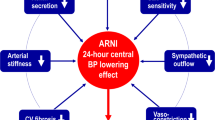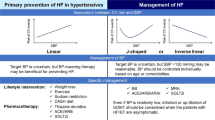Abstract
After a slow start, beta-blockers have become widely used as first-line agents in the treatment of hypertension, and recommended as such in recently published guidelines. There is evidence that the beta1-selective agents are more efficacious than non-selective blockers that inhibit both beta1 and beta2 receptors. Notwithstanding some earlier evidence to the contrary, it appears that beta1-selective drugs are equi-effective in young and elderly whites, younger, ie, under mid 60s, blacks. It is with the combination of age and being black that beta-blockers are usually less useful than some other groups of antihypertensive drugs, most notably calcium antagonists and diuretics. Primary prevention studies indicate beta-blockers reduce the incidence of cerebro-vascular disease and coronary heart disease in younger patients but they appear less effective than diuretics in the elderly. Beta-blockers are particularly indicated in patients who have experienced a myocardial infarction where they are often under used. There is some evidence that even in post-infarction patients with co-existent chronic obstructive airways disease, usually regarded as a contra-indication, experience an improved 2-year survival with the use of beta-blockers. Recently they have also been demonstrated to improve prognosis in heart failure patients, previously regarded as a contra-indication. Likewise, recent studies have shown that atenolol was at least as effective as captopril in improving the outlook in hypertensive patients with non-insulin dependant diabetes. While earlier comparisons with the non-selective lipid soluble propranolol indicated otherwise, comparisons with beta1-selective agents have indicated a similar effect on quality of life assessments with angiotensin-converting enzyme inhibitors.
This is a preview of subscription content, access via your institution
Access options
Subscribe to this journal
Receive 12 digital issues and online access to articles
$119.00 per year
only $9.92 per issue
Buy this article
- Purchase on Springer Link
- Instant access to full article PDF
Prices may be subject to local taxes which are calculated during checkout
Similar content being viewed by others
Author information
Authors and Affiliations
Rights and permissions
About this article
Cite this article
Prichard, B., Graham, B. & Cruickshank, J. New approaches to the uses of beta blocking drugs in hypertension. J Hum Hypertens 14 (Suppl 1), S63–S68 (2000). https://doi.org/10.1038/sj.jhh.1000989
Published:
Issue Date:
DOI: https://doi.org/10.1038/sj.jhh.1000989



